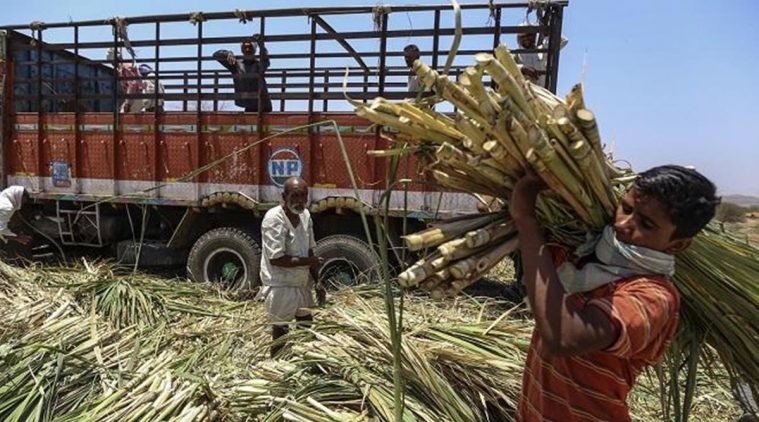 Wadghule said the fears over big capital in contract farming are significant for small and marginalised farmers. “How will the system protect the interests of a very poor farmer from the profit motive of large capitalist firms?” he asked. (Representational)
Wadghule said the fears over big capital in contract farming are significant for small and marginalised farmers. “How will the system protect the interests of a very poor farmer from the profit motive of large capitalist firms?” he asked. (Representational)
Last month, just a week before the Union government introduced far-reaching agricultural marketing reforms, in Nashik’s Vani region, farmer leaders had gathered to demand immediate payment for a batch of onions sold at a local mandi by a farmer. The trader had handed over a post-dated cheque for 20 days later. Eventually, local leaders had to threaten a protest.
“The Agricultural Produce Market Committee’s (APMC) near-complete control over the farmers’ ability to market their produce is a big disadvantage. That’s why the alternative to the APMC system, now promised by the Union government’s three ordinances, are a welcome change, but with riders,” said Hansraj Wadghule-Patil of the Shetkari Sangharsh Sanghatana in Nashik.
Wadghule pointed out Maharashtra had already delinked agriculture marketing from APMCs to a big extent under the previous BJP-led government, but instances of farmers being cheated by bogus traders buying on credit are plenty. “Dummy traders cheat farmers and take their goods on credit and then vanish. Under the old system, the APMC guaranteed the bonafide of the trader. That’s an important safeguard for farmers,” Wadghule said.
Through three ordinances issued on June 5, farmers are now independent of the heavily controlled and regulated APMC mandis and are permitted to sell their produce outside these markets. The other ordinances remove stocking restrictions on farm produce under the Essential Commodities Act, and legalise contract farming in order to attract big corporates to cultivation.
Wadghule said the fears over big capital in contract farming are significant for small and marginalised farmers. “How will the system protect the interests of a very poor farmer from the profit motive of large capitalist firms?” he asked.
Despite those concerns, everyone is in agreement that the delinking of farm sales from APMCs is a welcome reform introduced by the Centre. “These are much-needed reforms, and freeing up farm produce from the Essential Commodities Act was something farmers and farmers’ leaders have demanded for decades,” said Chetna Sinha-Gala, founder and chairperson of the Mann Deshi Foundation that works with women farmers and farm entrepreneurs.
“The vulnerability of farmers is now reduced by the possibility of multiple choices or multiple markets or multiple buyers for their produce. This will hopefully change the terms of the trade and tip the bargaining power in favour of farmers. Until now, the entire chain from APMC, mandis, the middle-men or aggregators, the traders have all sucked the farmer dry. And at election time governments tend to keep prices artificially low to favour urban consumers while the losers are always the small and marginal farmers, or those in remote areas who anyway struggle to even bring their produce to the mandis at the right time,” she said.
In other words, the Farmers’ Produce Trade and Commerce (Promotion and Facilitation) Ordinance, 2020, attempts to make the farm a market too, from where either physical or electronic sale of produce to a consumer or retailer or exporter or aggregator is possible; the farmer may choose to pay a service charge to a Farmer Producer Company that works through aggregators and managers and may choose not to use the APMC market yard at all.
Already, with the government indicating that it will support the setting up of 10,000 Farmer Producer Organisations that can aggregate, grade, segregate, store and market produce, existing FPOs have begun to discuss the opportunities. “FPOs from five districts met me in Latur this week, and trader friends in big cities have also asked me if any FPOs would like some support. An alternative chain of marketing will be strengthened soon,” said Pasha Patel of the BJP, a farmers’ leader and former member of the legislative council.
He added that the APMCs, especially given their traditional linkages with farmers and also the gestation time for the new structures, will continue to play a role. “No farmer will migrate to the new system unless he is certain of getting a better deal,” Patel told The Sunday Express. He called the ordinances the “true Independence Day” for Indian farmers, while APMCs, a political hotbed, would also now have to “reform or die”.
Retired bureaucrat Dr Sudhir Kumar Goel, who served as additional chief secretary for Agriculture and Marketing, warned that the new ordinances only change the rules of the game, but not the players, for while they offer an alternative, they do not guarantee that the alternative will be embraced by farmers, aggregators, FPOs, traders, or politicians.
“It is a very long journey ahead. Farmers had the choice earlier also to sell to housing societies or retailers, but they were never suitably strengthened… To exploit these ordinances, we will need a cadre of service providers who I would call agri-architects, who can horizontally integrate the various verticals — seed, fertiliser, labour, quality and grading of produce, storage, certification, marketing, all services that are disjointed today,” he said. Goel added there will now be plenty of opportunities in creation of technology platforms and capacity-building, and those offering such an integrated service to farmers will be able to tap the potential created.